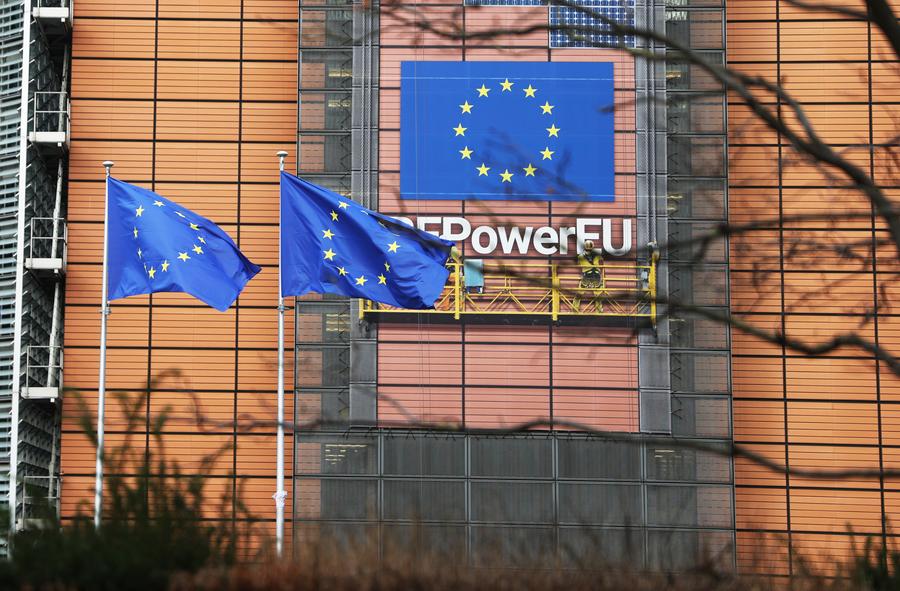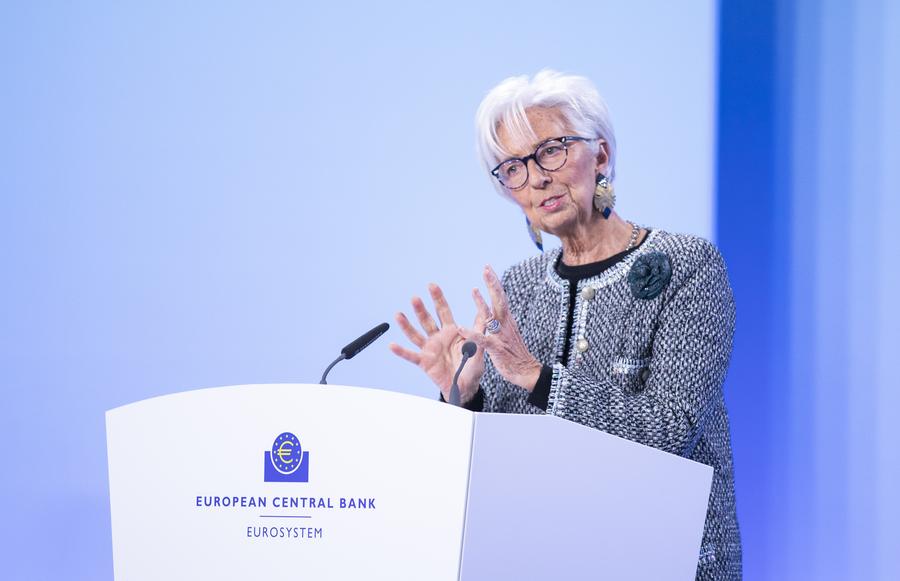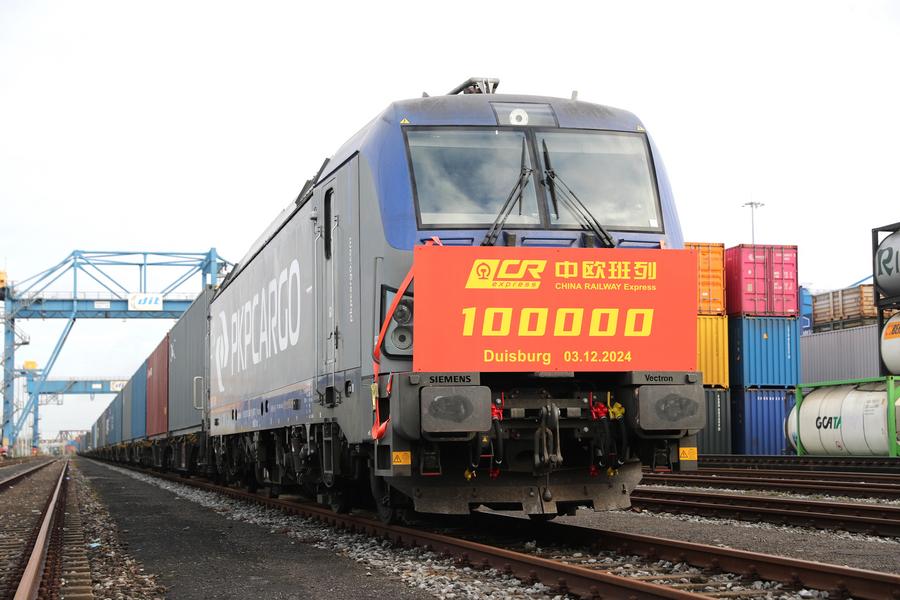Combined internal, external risks cast shadow on eurozone economic outlook

This photo taken on Nov. 15, 2023 shows part of the European Commission building in Brussels, Belgium. (Xinhua/Zhao Dingzhe)
The newly appointed European Commission faces mounting pressure to address potential trade actions from the incoming U.S. administration while urgently seeking ways to tackle policy uncertainties and structural challenges.
BRUSSELS, Dec. 16 (Xinhua) -- The Eurozone economy remains sluggish after five quarters of stagnation, grappling with overlapping internal and external risks.
The newly appointed European Commission faces mounting pressure to address potential trade actions from the incoming U.S. administration while urgently seeking ways to tackle policy uncertainties and structural challenges.
HOPE FOR RECOVERY SHATTERED
In November, the eurozone purchasing managers' index (PMI) for both the manufacturing and services sectors fell below the boom-bust line of 50, while the European Commission's economic sentiment indicator remained weak. Meanwhile, base effects have pushed inflation higher, prompting the European Central Bank (ECB) to take a more measured approach to balancing economic growth and inflation.
Political instability in Germany and France, the "twin engines" of Europe, further hampers Eurozone prospects for recovery.
Despite Germany, the Eurozone's largest economy, narrowly avoiding a recession in the third quarter, key industries such as machinery manufacturing, automotive, and chemicals continue to struggle with rising production costs, declining industrial orders and output, and delays in structural transformation.
Jens-Oliver Niklasch, an economist at Landesbank Baden-Wuerttemberg, said that Germany's economy is likely to fare worse in the final quarter, hinting that the stagnating domestic economy and mounting geopolitical risks will likely lead to a further decline in GDP in the coming year.
The outlook for France is equally grim. The French National Assembly voted in favor of the no-confidence motion, compelling then Prime Minister Michel Barnier to resign and causing the government to collapse just months into office.
"Our macroeconomic figures were about to improve, but if the government falls now and no tailor-made 2025 budget gets voted through parliament, we'll be sliding into an economic crisis. It would be catastrophic," Anne-Sophie Alsif, chief economist at accounting and consulting firm BDO France, told Germany's international broadcaster Deutsche Welle ahead of the vote.

European Central Bank (ECB) President Christine Lagarde speaks during a press conference at the ECB headquarters in Frankfurt, Germany, Dec. 12, 2024. (Xinhua/Zhang Fan)
ECB President Christine Lagarde said early this month that economic growth in the eurozone is expected to slow in the short term. Medium-term prospects remain uncertain and dominated by downside risks.
She emphasized the impact of geopolitical risks and mounting threats to international trade, highlighting that the eurozone's dependence on open trade and its integration into global supply chains makes it vulnerable to external shocks, such as potential trade barriers that could affect production and investment.
U.S. IMPACT ON EUROZONE
Europe's economy is faltering, partly due to poor structural reforms, stalled industrial transformation, weak domestic growth drivers, and declining external demand. U.S. factors also contribute to the eurozone's frailty.
During U.S. President Joe Biden's term, the United States implemented policies such as the Inflation Reduction Act and the CHIPS and Science Act, using massive subsidies and other unfair competitive practices to promote the domestic production of green technologies and to incentivize the reshoring of semiconductor manufacturing to the United States.
With Donald Trump re-elected as U.S. president, his proposed tariffs on imported goods have raised significant concerns in Europe. Former European Commissioner for Economy Paolo Gentiloni has warned that America's growing protectionist trade policies could severely impact both the United States and the EU, with Germany and Italy being the primary victims.
"His second term in office hits the European economy at a much less convenient moment than the first. Back in 2017, the European economy was relatively strong. This time around, it is experiencing anaemic growth and is struggling with lost competitiveness," said Carsten Brzeski, global head of Marco division of ING Research.

Donald Trump (2nd, R) attends the opening bell ceremony at the New York Stock Exchange in New York, the United States, on Dec. 12, 2024. (NYSE Group/Handout via Xinhua)
In addition, the euro may once again face the challenge of parity with the U.S. dollar. In the fall of 2022, it reached parity with the dollar for the first time, influenced by the Russia-Ukraine conflict and an energy crisis. Economists predict that the euro may approach parity with the dollar due to upcoming U.S. tariffs, a sluggish economy, and a strengthening dollar.
Analysts warn that if it happens, it could drive up the cost of imported raw materials, heighten inflationary pressures, and complicate the ECB's monetary policy decisions.
POTENTIAL FOR CHINA-EU COOPERATION
The China Chamber of Commerce to the EU and consultancy Roland Berger recently released a report identifying "uncertainty" as the key theme for Chinese businesses operating in Europe. Chinese enterprises widely believe that politicizing economic issues significantly impacts the business sector.
This year, the EU imposed tariffs on Chinese electric vehicles. Other Chinese industries critical to Europe's green transition, such as photovoltaics, wind turbines, and hydrogen technology, are also facing various challenges posed by the EU.
Noting that the EU and China remain important to each other amidst geopolitical shockwaves, Denis Depoux, global managing director at Roland Berger, said it is hoped both sides could understand each other's concerns and resolve issues through new strategies and rebalanced environments.
China and the EU are now each other's major trading partners and investment destinations. According to Chinese statistics, the bilateral trade volume reached 783 billion U.S. dollars in 2023, with cumulative mutual investments exceeding 250 billion dollars.
EU greenfield investments in China have proliferated this year; The Hungary-Serbia railway, a flagship Belt and Road project, has progressed steadily; Nearly 20 EU countries have received visa-free entry to China; And the 100,000th China-Europe freight train successfully arrived in Germany early this month.

This photo taken on Dec. 3, 2024 shows the 100,000th China-Europe freight train at Duisburg Intermodal Terminal (DIT) in Duisburg, Germany. (Xinhua/Du Zheyu)
In 2025, China and the EU will celebrate 50 years of diplomatic relations. Experts note that the EU should work with China to counter de-globalization trends and rising protectionism. Such efforts would mutually benefit China and the EU, fostering positive global trade and investment growth while providing greater stability and certainty in an increasingly turbulent world.
Photos
Related Stories
- ECB expects eurozone inflation to keep falling
- Eurozone banks tighten credit standards further: ECB
- ECB rate hikes might knock 3.8 pct off euro area economy: analysis
- Eurozone Q2 GDP rebounds, inflation slows but remains a concern
- Eurozone consumers' perception of inflation much higher than reality: study
Copyright © 2024 People's Daily Online. All Rights Reserved.









